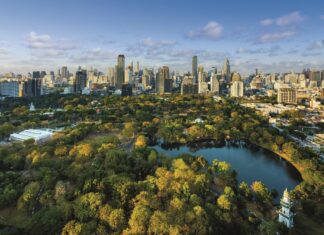Simon Pollard, Martin Baxter, Frederic Coulon, Mónica Rivas-Casado, Vincenzo Belgiorno and Vincenzo Naddeo consider how green economy leadership can be fostered through inclusive postgraduate curricula.
Environmental engineering and technology are at the forefront of addressing global sustainability challenges, requiring professionals equipped with green skills to drive the transition to a low-carbon economy, often through economic development or regeneration initiatives. Postgraduate education plays a critical role in fostering these skills, yet existing curricula can struggle to integrate emerging disciplines, drive interdisciplinary collaboration or provide the leadership training that has become essential for the green economy. A key challenge lies in designing comprehensive programmes that prepare students not only as technical experts, but also as effective leaders in socio-political and economic contexts where advocacy and business awareness have become important facets of professional life.
Here, we propose a novel postgraduate curriculum framework for environmental engineers and technologists, emphasising technical depth, systems thinking and cross-disciplinary learning. Our approach bridges traditional engineering domains with new areas, including artificial intelligence (AI), circular economy strategies and nature-based solutions (NbS), while integrating leadership and strategic communication skills.
Green economy drivers
International commitments – especially the United Nations Conferences of the Parties (COPs) on climate change and biodiversity – have stimulated the green economy, cleantech innovation, green jobs and fiscal instruments to forestall the worst impacts from anthropogenic climate change and biodiversity decline. Green finance, investment and disclosure platforms have emerged from sustained attention to the mitigation and adaptation responsibilities of business, and new commitments to green trade are taking root.
This advancement of the green economy has created a pressing need for a workforce equipped with interdisciplinary skills spanning environmental technology, policy leadership and civic engagement. However, current educational programmes have been sluggish to adapt to these integrated demands, with many curricula siloed within disciplinary boundaries and insufficiently aligned to international calls for action.
Green skills transition
A green skills transition is the global response to jobs needing to become more conscious of climate and nature recovery. Not all jobs will be ‘green’, but most are expected to be climate and biodiversity literate.
Timing is especially important with respect to curriculum development in higher education given the costs of change and a need to ensure a sustained market for courses. However, we suggest there is considerable evidence for the demand and sufficient policy momentum such that universities should consider opportunities to develop their programmes. Furthermore, technology transitions are well under way in the energy, water, transport, infrastructure and agriculture sectors, which have historically been good employers for postgraduate technologists and engineers. To that end, there is a fertile employment base for students with the requisite skills.
Green economy curriculum
Higher education institutions play a key role in preparing next-generation leaders to help accelerate the green economy. Specialist skills are conventionally developed at the end of undergraduate programmes. Yet, some commentators suggest curricula have not moved fast enough to meet the green skills demand.
Operating in the multidiscipline green economy requires technical depth across core disciplines, combined with the interpersonal and political skills sufficient to create compelling narratives, and critical thinking at the intersection of established fields and emerging frontiers. Recognising these demands, modern postgraduate curricula must balance technical rigour, interdisciplinary collaboration and adaptive teaching methodologies.
We propose a blended framework comprising three core components: (a) structured taught modules; (b) group-based collaborative work; and (c) individual research projects. These components aim to develop technical expertise, critical analysis, interpersonal skills and leadership qualities.
Focus on sustainability
The curriculum should have as its base foundational modules on sustainable engineering and renewable technologies focused on decarbonisation, resource efficiency and the integration of NbS. A distinction between engineering and technology allows a positioning of business transitions in a broader socio-technical context, including funding for technology pipelines, asset management, decision analysis and regulation.
We contend that engineers also need to understand the earth system to enable them to place technology development in context, especially with reference to the circular economy, with its focus on resource efficiency and materials recovery. Emerging technologies, such as AI and robotics equip students to navigate digital transformations and optimise environmental technologies. Finally, legislation, leadership and business strategy, including entrepreneurship, are boardroom topics with which postgraduates need some familiarity.
A critical component of postgraduate training is an individual research project that enables students to dive deeply into cross-faculty topics such as AI-driven environmental optimisation, engineering leadership for a just transition, or sustainable resource management. These allow students to develop experimental and analytical skills, while encouraging them to translate data into actionable insights for decision-making. Producing a well-structured thesis or publishable manuscript not only develops communication skills, but also positions graduates as thought-leaders.
Ethical awareness
The green economy demands not only technical expertise, but also ethical sensitivity, cultural awareness, and systems thinking. Courses should prepare students to navigate issues such as global equity, social justice and the unintended consequences of technological innovation. For example, how can graduates ensure that infrastructure projects respect local communities and ecosystems? Or might AI applications inadvertently exacerbate resource consumption and, if so, how might these impacts be mitigated?
Addressing these challenges requires curricula that emphasise critical reflection and foster cross-departmental collaboration (e.g. environmental science, engineering, law and business). Partnerships with industry, government and NGOs are also deemed vital to bridge the gap between academic knowledge and practical application, offering students hands-on experience and mentorship. Curriculum success should then be evaluated using tangible metrics such as employability in green jobs, leadership in policymaking and contributions to green innovation. Alumni case studies can illustrate the transformative potential of such programmes, while real-world engagement with policy and industry stakeholders ensures relevance to the evolving global challenges.
Our proposed curriculum design for environmental engineers and technologists integrates technical depth, systems thinking and interdisciplinary collaboration, while emphasising the personal and professional competencies essential for leadership in the green economy.
The novelty of our curriculum lies in its holistic design that bridges traditional engineering expertise with emerging areas such as AI, circular economy strategies and NbS, all contextualised within a broader socio-political framework. We advocate cross-departmental collaboration, innovative teaching methods and active engagement with international efforts led by NGOs and institutions promoting the green economy. The key message is clear: postgraduate education must evolve rapidly to meet the rising demand for green skills. Our proposed approach equips students with the technical expertise to innovate, and the interpersonal and strategic abilities to influence policies and lead transformative projects. By cultivating technically proficient, socially aware and politically adept graduates, it positions universities as pivotal drivers of sustainable development. As the UN Secretary-General aptly describes, the green economy is the ‘economy of the future’. A revised curriculum is required to ensure future leaders are well prepared to define, lead, and succeed in this global transition.
The authors: Simon Pollard is Professor of Environmental Risk Management – Project Consultant Executive Office, Cranfield University, UK; Martin Baxter is Deputy CEO at the Institute of Environmental Management and Assessment (IEMA) and Visiting Professor at Cranfield University, UK; Frederic Coulon is Professor of Environmental Chemistry and Microbiology at the Cranfield Water Science Institute, Cranfield University, UK; Mónica Rivas-Casado is reader in Environmental Systems Engineering at the Cranfield Environment Centre, Cranfield University, UK; Vincenzo Belgiorno is Head of the Sanitary Environmental Engineering Division (SEED), University of Salerno, Italy; and Vincenzo Naddeo is director of SEED, Department of Civil Engineering, University of Salerno, Italy.
Acknowledgments: Simon Pollard acknowledges engagement in the Oxford to Cambridge pan-Regional Partnership through which some of the thinking here was developed. Vincenzo Naddeo and Vincenzo Belgiorno are supported through FARB projects (300393FRB22OLIVA, 300393FRB22NADDE, 300393FRB23NADDE, 300393FRB22ZARRA) and by SPORE-MED, part of the PRIMA programme funded by the European Union (Agreement 2322).
Declaration of interests. The authors declare that they have no known competing financial interests or personal relationships that could have appeared to influence the work reported in this paper.
| Module | Illustrative content | Options for delivery |
| Sustainable engineering and manufacturing | Unit processes and flowsheets; physical, chemical biological treatment; low carbon/energy treatment; engineering and natural processes; nutrient recovery; eco-design and circular economy; ëbreakthroughí innovation; logistics and supply chains | Instructional, with field study visits to facilities and case studies in process flowsheets |
| Renewable technologies | Technology pipelines and technology readiness levels; solar, wind, biogas; design, build, operation and maintenance strategies; costings and net present value; infrastructure design; financing technology; planning and permitting; strategic environmental assessment | Opportunity for industry-led instruction and field visits to small, medium and large utilities; opportunities to showcase the university estate (hidden curriculum) |
| Earth system science | Climate system; ecological principles; planetary boundaries and human health; resource stocks; heat transfers; ocean currents and oscillations; residence times for global pollutants in environmental media; food webs; persistent contaminants; biodiversity and its importance | Instructional, with classroom discussion on interconnections |
| Systems thinking | Stocks, flows and system morphologies; feedback mechanisms; system resilience; tools for systems analysis | Instructional, with case studies of varying system complexity and feedback |
| Decision science, risk and resilience | Risk and options appraisal tools; deliberative processes; qualitative and quantitative tools; stakeholder engagement; concepts of resilience; data analytics; case studies; scenarios and futures | Instructional, with case study examples worked through in peer groups |
| Green economics and markets | Demand and supply; five ëcapitalsí; ëdoughnut economicsí; history of environmental economics; critical minerals and materials; stocks and material flows in economies; green trade and tariffs | Instructional, with industry examples, successes and market failures |
| Advocacy and leadership | Empowerment; agency; leaders and their styles; personality archetypes and operational styles; organisational politics; negotiation; cultural awareness; gender, inequality and the Global South; environmental justice and the just transition; Indigenous science and evidence | Reflective exercises, with multiple opportunities for communications practice with feedback |
| Legislation, policy and regulation | History of environmental legislation; policy design and policy appraisal; public risk and market failure; regulatory instruments and enforcement strategies; risk-based regulation; incentive mechanisms; international policy landscape; environmental prosecutions | Instructional, with potential for peer debates; negotiation skills development |
| Business strategy and entrepreneurship | Strategic competitive advantage; institutional delivery of services; private and public models of corporate ownership; technology strategies; investment strategies; venture capital and new venture appraisals | Case study examples and potential new business ëpitchingí exercises with feedback |








